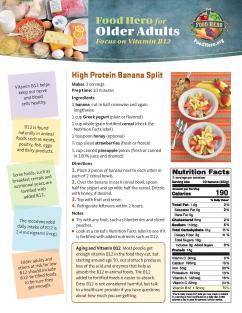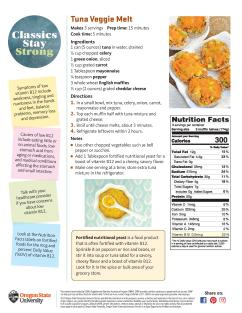Focus on Vitamin B12
Aging and Vitamin B12
Most people get enough vitamin B12 in the food they eat, but starting around age 50, our stomach produces less of the acid and enzymes that help us absorb the B12 in animal foods. The B12 added to fortified foods is easier to absorb. Extra B12 is not considered harmful, but talk to a healthcare provider if you have questions about how much you are getting.
More about Vitamin B12
- Vitamin B12 helps keep our nerve and blood cells healthy.
- B12 is found naturally in animal foods such as meats, poultry, fish, eggs and dairy products.
- Some foods, such as breakfast cereals and nutritional yeast, are fortified with added B12.
- The recommended daily intake of B12 is 2.4 micrograms (mcg).
- Older adults and others at risk for low B12 should include B12-fortified foods to be sure they get enough.
Classics Stay Strong
- Symptoms of low vitamin B12 include weakness, tingling and numbness in the hands and feet, balance problems, memory loss and depression.
- Causes of low B12 include eating little or no animal foods, low stomach acid from aging or medications, and medical conditions affecting the stomach and small intestine.
- Talk with your healthcare provider if you have concerns about low vitamin B12.
- Look at the Nutrition Facts labels on fortified foods for the mcg and percent Daily Value (%DV) of vitamin B12.
Fortified nutritional yeast is a food product that is often fortified with vitamin B12. Sprinkle it on popcorn or rice and beans, or stir it into soup or tuna salad for a savory, cheesy flavor and a boost of vitamin B12. Look for it in the spice or bulk area of your grocery store.




